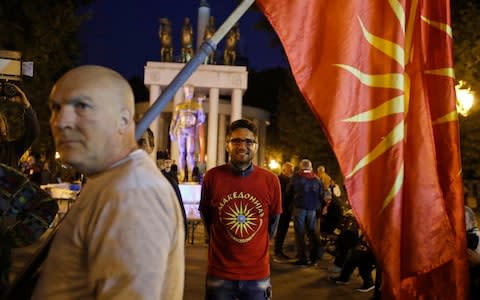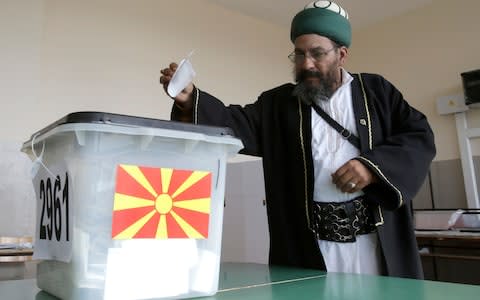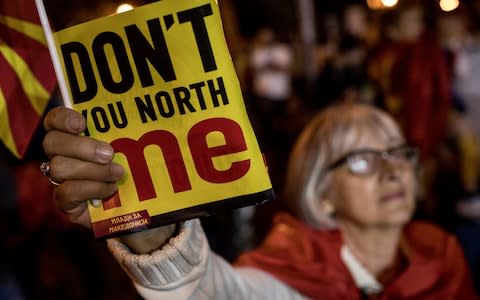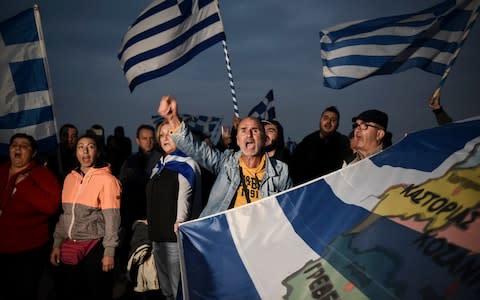Macedonia votes to change its name and end rift with Greece, but low turnout may thwart progress

Macedonia’s referendum on whether to change its name to North Macedonia and open the way to EU and NATO membership has resulted in a huge margin of victory for the new title, but a disappointingly low turnout.
Late last night, just 34% of eligible voters were reported to have voted in the referendum which, it was hoped, would end a 27-year diplomatic impasse with Greece.
With ballots from 93 percent of polling stations counted, 91.3 percent of votes favoured the name changing to North Macedonia, compared to 5.7 percent opposed, according to the electoral commission's official count.
Despite the low turnout, Zoran Zaev, the prime minister, said the country had embraced the deal to rename the country. “I think the huge majority of citizens who voted have chosen the European path for Macedonia,” he said.
He urged the conservative opposition to ratify the deal in parliament. If not, he would call early elections.

Greece reacted to the result with the Foreign Ministry saying it "remains committed" to its June agreement with Skopje under which Athens would drop its objections to Macedonia joining the EU and NATO in return for a change of name.
Greek Prime Minister Alexis Tsipras expressed his support for his Macedonian counterpart in a telephone call in which he hailed the "determination and courage" of Zoran Zaev to "complete the implementation of this agreement", a government source told AFP.

NATO head Jens Stoltenberg said on Twitter the result was a "historic opportunity", adding: "NATO's door is open."
The referendum could still be interpreted as valid by the government, despite not reaching the 50% turnout threshold, analysts said.
“The government has always said that the referendum is consultative,” said Simonida Kacarska, the director of the European Policy Institute, a think tank in Skopje.
“We will have to see what the vote is. But a low turnout could make it more difficult to get the deal through and to obtain the two-thirds majority of support in parliament that is needed to make changes to the constitution.”
The country’s long-standing desire to be known as Macedonia has been blocked by Athens ever since the Balkan country declared independence from the wreckage of the former Yugoslavia in 1991.
The Greeks are fiercely protective of their own region of Macedonia and resent what they regard as the Macedonians’ appropriation of Hellenistic culture and historical figures such as Alexander the Great.

But in an accord signed in June, Athens agreed to lift its veto on the tiny Balkan nation joining NATO and the EU if it changes its name to North Macedonia.
The referendum was a chance to ditch the long-winded and inelegant name that Macedonians have been saddled with for the last 27 years – the Former Yugoslav Republic of Macedonia, or FYROM for short.
“There are no jobs for young people here. My son has no prospects. We have big economic problems. So I think joining the EU and Nato will offer us a better future,” said Tiho, a 56-year-old taxi driver in the capital, who said he had voted yes.
But others deeply resent having to add a geographical qualifier to their country’s name, saying that the title North Macedonia is a humiliation and diminishes the country’s stature.
“It’s emotional. This is a country whose language and identity have been contested by its neighbours.
“Part of the population is concerned that the change of name will change certain identity markers, even though our nationality and language will be recognised as Macedonian,” said Prof Kacarska, who gained her PhD at Leeds University.
The question that was put to voters in the referendum was: "Are you in favour of membership in the European Union and NATO by accepting the deal between (the) Republic of Macedonia and Republic of Greece?"
Both Zoran Zaev, the Macedonian prime minister, and his Greek counterpart, Alexis Tsipras, have stuck their necks out politically and face trenchant opposition from domestic critics.

Nikola Dimitrov, the foreign minister and one of the architects of the deal, voted in the centre of the capital, describing the referendum as a “historic cross-roads” and the potential start of a new chapter for the country.
“This is a big, big day for Macedonia and for our friendship with Greece. I’m excited. It’s also my birthday, so I hope there is an omen in that too,” he said.
But hours later, opposition groups who had called for a boycott of the vote declared the referendum a failure.
Outside parliament, a few hundred anti-referendum campaigners in exuberant mood gathered in front of a stage, celebrating to rock music, draping Macedonian flags over their shoulders and holding banners that read “Macedonia Forever” and “This Was, Is and Will Remain Only Macedonia.”
“Macedonian people do not want to join NATO. They don't want the change of name, identity, history and tradition of Macedonian people," said Dragan Ugrinovski, from opposition group Macedonia is Boycotting.
Ivo Kotevsi, from the conservative opposition party VMRO-DPMNE, said: "Everything is wrong with the deal. It's wrong to change the constitution, it's wrong to change the name."

